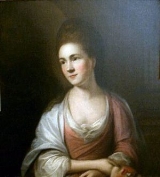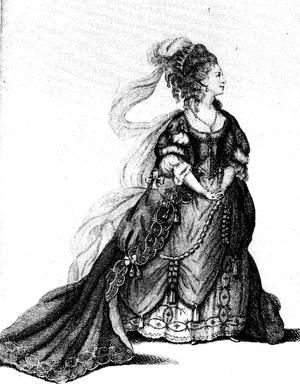
Elizabeth Younge
Encyclopedia


English people
The English are a nation and ethnic group native to England, who speak English. The English identity is of early mediaeval origin, when they were known in Old English as the Anglecynn. England is now a country of the United Kingdom, and the majority of English people in England are British Citizens...
actress who specialized in Shakespearean
William Shakespeare
William Shakespeare was an English poet and playwright, widely regarded as the greatest writer in the English language and the world's pre-eminent dramatist. He is often called England's national poet and the "Bard of Avon"...
roles.
Biography
She was born near Old Gravel Lane, SouthwarkSouthwark
Southwark is a district of south London, England, and the administrative headquarters of the London Borough of Southwark. Situated east of Charing Cross, it forms one of the oldest parts of London and fronts the River Thames to the north...
. Little is known about her early life and family background. An Elizabeth Young, daughter of Samuel and Mary Young, was baptized at St Olave's, Southwark, on 14 January 1744, but it is not known if this was the same person. Discrepancies in her reported age at the time of her death suggest that she was born around 1740 or around 1745.
Around 1767–8, Younge was introduced to George Garrick, younger brother of the theatre manager David Garrick
David Garrick
David Garrick was an English actor, playwright, theatre manager and producer who influenced nearly all aspects of theatrical practice throughout the 18th century and was a pupil and friend of Dr Samuel Johnson...
. The younger Garrick was sufficiently impressed by Younge's acting that he took her to his brother. The timing was fortunate for Younge, as it was during that season that the actress Hannah Pritchard
Hannah Pritchard
Hannah Pritchard was an English actress.Born Hannah Vaughan and married to an actor William Pritchard at a young age, she first attracted attention as a singer at Bartholomew Fair in 1733 She was born on 11th July 1711 to her father Oliver Pritchard. Her mothers name is not known...
retired, and Garrick was having difficulties with Ann Barry. Garrick liked to keep a good actress in reserve, and not only hired Younge for the Drury Lane
Theatre Royal, Drury Lane
The Theatre Royal, Drury Lane is a West End theatre in Covent Garden, in the City of Westminster, a borough of London. The building faces Catherine Street and backs onto Drury Lane. The building standing today is the most recent in a line of four theatres at the same location dating back to 1663,...
company, but also gave her personal tuition.
Elizabeth Younge's début at Drury Lane was on 22 October 1768, when she appeared as Imogen
Imogen (Shakespeare)
Imogen was the daughter of King Cymbeline, in Shakespeare's play, Cymbeline. She was described by William Hazlitt as "perhaps the most tender and the most artless" of all Shakespeare's women.-Name:...
in Cymbeline
Cymbeline
Cymbeline , also known as Cymbeline, King of Britain or The Tragedy of Cymbeline, is a play by William Shakespeare, based on legends concerning the early Celtic British King Cunobelinus. Although listed as a tragedy in the First Folio, modern critics often classify Cymbeline as a romance...
. Garrick was pleased enough to raise her salary from £2 to £3 per week, while William Hopkins, the prompter, wrote of her performance in his diary:
- Miss Younge — an elegant Figure in both dresses, has a very good voice, but wants management, — a great deal of acting about her, and would make a great figure, if she had a better face. Upon the whole she played the part amazingly well, and had deserved the applause.
Younge's next parts were Jane Shore and Ovisa in the première of Alexander Dow
Alexander Dow
Alexander Dow was an Orientalist, writer, playwright and army officer in the East India Company.-Life:...
's Zingis. This play was not well received, and Younge was hissed by the audience. On 7 April 1769, she played Perdita
Perdita (The Winter's Tale)
Perdita is one of the heroines of William Shakespeare's play, The Winter's Tale. She is the daughter of Leontes, King of Sicilia, and his wife Hermione....
in Florizel and Perdita, Garrick's adaptation of The Winter's Tale
The Winter's Tale
The Winter's Tale is a play by William Shakespeare, originally published in the First Folio of 1623. Although it was grouped among the comedies, some modern editors have relabelled the play as one of Shakespeare's late romances. Some critics, among them W. W...
. That summer, she worked at Richmond with James Love, but in the autumn she returned to Drury Lane and on 2 October, she played Juliet
Juliet Capulet
Juliet is one of the title characters in William Shakespeare's tragedy Romeo and Juliet, the other being Romeo. She is the daughter of old Capulet, head of the house of Capulet. The story has a long history that precedes Shakespeare himself....
in Romeo and Juliet
Romeo and Juliet
Romeo and Juliet is a tragedy written early in the career of playwright William Shakespeare about two young star-crossed lovers whose deaths ultimately unite their feuding families. It was among Shakespeare's most popular archetypal stories of young, teenage lovers.Romeo and Juliet belongs to a...
.
Remaining at Drury Lane, Younge took the part of Imogen again, in the new season in 1770. This was followed by Alcmena in Amphitryon
Amphitryon
Amphitryon , in Greek mythology, was a son of Alcaeus, king of Tiryns in Argolis.Amphitryon was a Theban general, who was originally from Tiryns in the eastern part of the Peloponnese. He was friends with Panopeus....
, Lady Easy in The Careless Husband, and Almera in The Mourning Bride, but after quarrelling with Garrick over her salary, she left Drury Lane for Capel Street Theatre in Dublin, where she met with considerable success. She spent the summer of 1771 in Bristol
Bristol
Bristol is a city, unitary authority area and ceremonial county in South West England, with an estimated population of 433,100 for the unitary authority in 2009, and a surrounding Larger Urban Zone with an estimated 1,070,000 residents in 2007...
, and, after coming to some agreement with Garrick, returned to Drury Lane to play Imogen once again on 26 September. Her performance, according to Hopkins, was "receiv'd with Great Applause".
Younge remained at Drury Lane until 1778, though in the summer months she also performed in other cities. Her relationship with Garrick seems to have been an uneven one: he greatly respected her talent, but was irritated by her temperament, and at one stage gave a leading role to a lesser actress in order to belittle her. She played the role of Viola in front of King George III, though Garrick was forced to send her a threatening letter after she attempted to withdraw from the play on the grounds of having a cough.
Younge was the fifth highest paid actress at Drury Lane thatre at the time of Garrick's retirement, earning £12 per week. Following a dispute with his successor, Thomas Sheridan, over money, she moved to Covent Garden after the 1778–9 season, and remained there until her death.
Younge married Alexander Pope, a young Irish artist and actor, on 9 August 1785, despite being more than twenty years his senior. They had one son.
Elizabeth Younge was forced to give up her career on 26 January 1797, because of serious illness. She died on Wednesday 15 March 1797, at her home, 5 Half Moon Street. Some sources give her age at death as fifty-two; others report it as fifty-seven. She was buried at Westminster Abbey
Westminster Abbey
The Collegiate Church of St Peter at Westminster, popularly known as Westminster Abbey, is a large, mainly Gothic church, in the City of Westminster, London, United Kingdom, located just to the west of the Palace of Westminster. It is the traditional place of coronation and burial site for English,...
on 22 March.
External links
- Terry Enright: Elizabeth Pope at the Oxford Dictionary of National Biography

